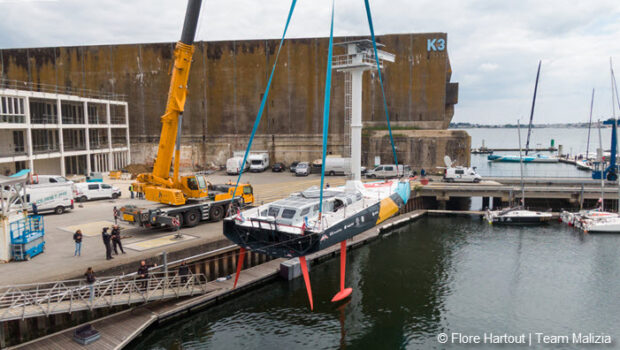As IMOCA teams prepare for the 2025 season, their winter refit programs had to address a rule change regarding its propulsion system.
The Class Rules already require the 60-footers to have a motor for critical situations such as docking, undocking, or recovering a person overboard while also playing a role in charging the yacht’s energy systems when renewable sources like solar and hydro power are insufficient.
But new for 2025, the IMOCA class increased the necessary engine power requirement from 35HP to 45HP. Teams had three options for their current boats:
• Install a new, heavier 45HP diesel engine
• Keep the existing diesel engine and add 50 kilograms of compensating weight
• Opt for a hybrid solution, where teams are free to choose the setup without weight restrictions, as long as it matches the performance of a 45HP diesel engine.
Regardless of the propulsion system selected, each boat had to successfully complete a traction test and be capable of motoring for five hours at five knots.
“We asked ourselves: How can we race around the world on a high-tech yacht without the use of fossil fuels, at the same time improve performance, all while complying with new IMOCA class rules?” says Boris Herrmann, choosing to equip his IMOCA Malizia – Seaexplorer with a hybrid-electric propulsion and energy system.
“This system is our answer. It’s lighter, cleaner, and lets us maximize our renewable sources of energy. This is one of the most exciting upgrades to the boat and we are proud to lead that step towards more sustainable offshore racing.”
The custom setup centers on the Molabo ARIES i50 electric inboard motor. Operating at just 48 volts, the system is inherently safe-to-touch, eliminating the hazards and complexity of high-voltage marine systems.
The system is paired with the already installed Solbian solar panels and Watt and Sea hydrogenerators, as well as a new high-capacity battery bank from Solid State Marine and a Fischer Panda generator certified to run on hydrogenated vegetable oil (HVO).
“On top of looking at a more sustainable solution for motoring, we looked at how a hybrid solution could work with our renewable energy sources onboard, and how we could get the most out of our solar panels and hydrogenerators,” describes Jesse Naimark-Rowse. “That meant looking at energy storage.”
While lighter than a standard diesel engine, the new hybrid setup has a much larger battery bank, which means that far more of the renewable energy generated from solar and hydro power can be stored. Win-win!
“When we charge with solar in the day, we can store energy to get enough through the entire night without using the generator at all,” adds Naimark-Rowse. “And when we do need the Fischer Panda generator, it’s certified to run on hydrogenated vegetable oil and uses only half the fuel a conventional diesel setup would need to produce the same amount of energy.
“Beyond that, something as routine as leaving the dock can now be done entirely on electric power, without burning any fossil fuels or vegetable oil at all.”
SCUTTLEBUTT News Link !
DemirHindiSG 14 Mayıs 2025-19:09







